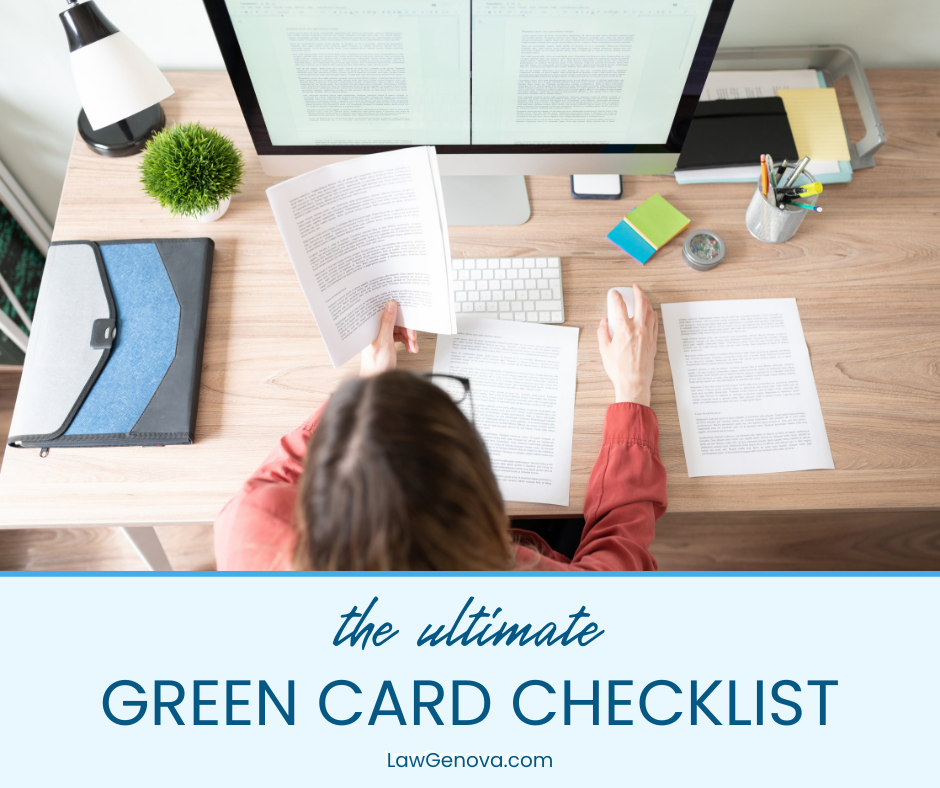When you apply for a green card in the United States, you need several documents that prove you’re eligible for permanent residency. Your attorney will go through your documents and send them to U.S. Citizenship and Immigration Services (USCIS) with your petition. But what documents do you need? This guide contains a green card checklist you can use to make sure you have all the supporting documentation USCIS needs to review and approve your petition.
The Ultimate Green Card Checklist
The reason you’re eligible for a green card (such as whether you’re an immigrant investor or you’ve married a U.S. citizen or lawful permanent resident) will determine the documents you need to provide with your petition. There are different forms for different situations, but the most common are:
- Form I-130 for family immigration
- Form I-140 for alien workers
- Form I-360 for Amerasians, widowers and special immigrants
- Form I-526 for alien entrepreneurs
- Form I-589 for people in removal proceedings
- Form I-730 for refugees and asylees
- Form I-918 for people with U nonimmigrant status
The following sections give you a green card checklist for each petition type.
Green Card Checklist for Form I-130
If you’re a U.S. citizen or lawful permanent resident (green card-holder) petitioning on a family member’s behalf, these are the documents you need to provide USCIS:
- Evidence of your citizenship (such as a copy of your birth certificate, your naturalization or citizenship certificate, or your unexpired U.S. passport)
- Evidence of your relationship with your family member (such as a birth certificate or marriage document)
- Evidence of a bona fide marriage (if you’re applying for a green card for your spouse)
Related: How to help your parents get green cards in the U.S.
A Note on Marriage Green Cards
You’ll likely need to provide a significant amount of evidence that you’re in a genuine marriage – that is, you didn’t simply marry your spouse so they could receive an immigration benefit. Your New York immigration attorney will give you more specific guidance, but generally, USCIS likes to see evidence such as:
- Joint ownership of property
- Bank accounts in both your names
- Leases or mortgage documents in both your names
- Birth certificates for any children you have together
- Evidence that you and your spouse have traveled together (plane tickets, hotel receipts and other documentation)
Green Card Checklist for Form I-140
If you’re an employer petitioning on behalf of an alien worker, you need to provide USCIS with:
- A copy of the alien worker’s passport
- A copy of the alien worker’s birth certificate
- A copy of the alien worker’s resume or curriculum vitae
- Evidence of the alien worker’s education and qualifications (such as diplomas, transcripts, licenses or certification)
- Evidence of the alien worker’s past work experience (such as performance evaluations, letters from previous employers or pay stubs)
- A copy of the alien worker’s Form I-94, if available
- A copy of the alien worker’s visa, if available
Related: What it means to sponsor someone for a green card

Green Card Checklist for Form I-360
If you’re an Amerasian, a widow(er), or a special immigrant petitioning for your own green card, you need to provide USCIS with:
- A copy of your passport
- A copy of your birth certificate
- A copy of your marriage certificate, if applicable
- A copy of your divorce decree or your spouse’s death certificate, if applicable
- Evidence of your military service, if applicable
- Evidence of your employment, if applicable
Green Card Checklist for Form I-526
If you’re an alien entrepreneur investing in a new commercial enterprise in the United States, you may petition for your own green card using Form I-526. In that case, you need to provide USCIS with:
- A copy of your passport
- A copy of your birth certificate
- A copy of your resume or curriculum vitae
- Evidence of your education and qualifications (such as diplomas, transcripts, licenses or certification)
- A business plan for the new enterprise
- Evidence of your financial backing for the new enterprise (such as bank statements or investment documentation)
Green Card Checklist for Form I-589
If you’re in removal proceedings, your attorney may suggest that you apply for asylum or withholding of removal. In a situation like this, your attorney will give you a specific list of documents to provide; in general, you need to provide USCIS with:
- A copy of your passport
- A copy of your birth certificate
- A copy of your marriage certificate, if applicable
- A copy of your divorce decree or your spouse’s death certificate, if applicable
- Evidence of any persecution you have suffered in the past (such as police reports, medical records or news articles)
- Evidence of any fear of persecution you have in the future (such as expert opinions or letters from friends and family)
Related: Asylum and other immigration removal defense strategies
Green Card Checklist for Form I-918
If you have been granted U nonimmigrant status, you may be eligible to adjust your status to that of a permanent resident. To do so, you need to provide USCIS with:
- A copy of your passport
- A copy of your birth certificate
- A copy of your Form I-94
- A copy of your Form I-797, Notice of Action
- Evidence of your continued presence in the United States (such as pay stubs, school records or utility bills)
- Evidence of your good moral character (such as letters from friends, family or community leaders)
Note that these are not exhaustive lists of all the documents you may need to provide. Make sure to consult with an immigration attorney to see what other documents may be required in your specific case.

What Happens if You Don’t Include Enough Evidence With Your Green Card Petition?
If you don’t include enough evidence with your green card petition, USCIS may deny your application outright. In other cases, USCIS may issue what’s called a request for evidence (RFE). An RFE is a formal request from USCIS asking you to provide additional information or documentation to support your case.
It’s important to respond to an RFE promptly and completely; if you don’t, USCIS may deny your application. If you’re unsure of how to respond to an RFE, or if you have any other questions about the green card process, your immigration attorney will be there to help you. In fact, your lawyer will be the one who formally responds to your RFE on your behalf; it’s just up to you to find and provide the appropriate documentation.
How Long Does it Take to Get a Green Card?
The time it takes to get a green card varies depending on the specific category you fall into and whether you provide all the documentation USCIS needs on the first try. For example, if you’re petitioning for a family member, the process may take anywhere from several months to several years. If you’re an entrepreneur investing in a new commercial enterprise, the process may take a few months to a year. And if you’re in removal proceedings, the timeline is generally very fluid; it may happen quickly, or it may not.
It’s important to keep in mind that these timelines are just estimates; your specific case may take longer or shorter depending on a number of factors. For example, if you have a criminal history or if you’re from a country with a high rate of visa overstays, your case may take longer to adjudicate. The best way to get an accurate timeline for your specific case is to consult with an experienced immigration attorney. Your lawyer will be able to give you a more accurate estimate based on the specifics of your situation. You and your attorney can check the status of your case on the USCIS website.
Related: Step-by-step instructions for removing conditions on your green card
What Are the Benefits of Applying for a Green Card?
Although it seems like a lengthy process – and although you must provide a significant amount of documentation to USCIS when you apply – many people find that the benefits of getting a green card are worth it. For one, a green card gives you the ability to live and work permanently in the United States. You’ll also have access to government benefits, such as Social Security and Medicare, and you’ll be able to apply for U.S. citizenship after five years (or three years if you’re married to a U.S. citizen).
In addition, as a green card holder, you’ll be able to travel freely in and out of the United States. You won’t need to get a visa every time you want to visit; instead, you’ll be able to use your green card as proof of your status.
All in all, although the process of applying for a green card can be long and complicated, many people find that the benefits are well worth the effort. If you’re thinking about applying for a green card, your immigration attorney will help you through the process.
Do You Need to Talk to an Immigration Attorney About Your Own Green Card Checklist?
If you need to talk to an immigration attorney, we may be able to help you. Call our office at 914-481-8822 to schedule a consultation with an experienced, knowledgeable immigration attorney who can answer your questions and give you the legal advice you need.


